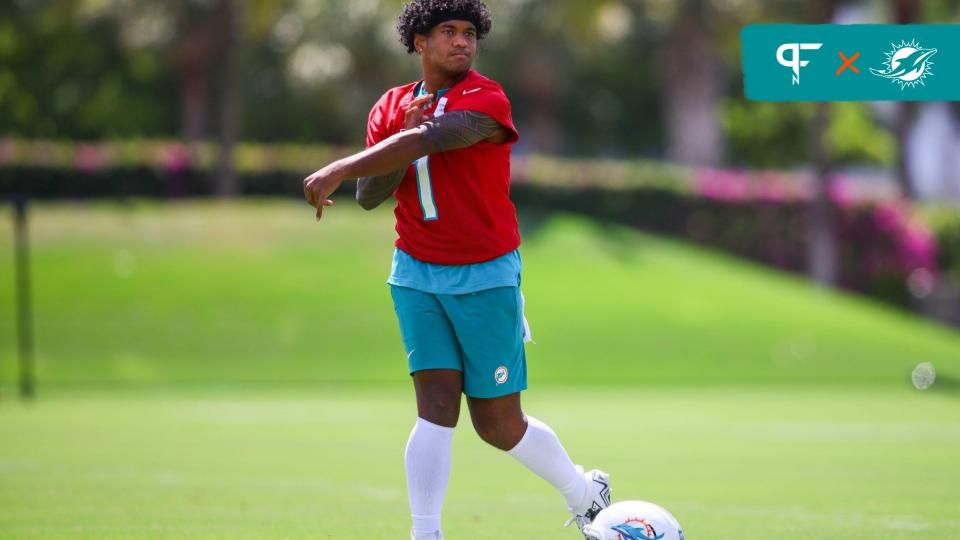With its revenue sharing and salary cap, the NFL is indeed a bit like socialism for billionaires. Now some of those same billionaires apparently want to extend those same otherwise taboo economic principles to suppress salaries for their sport’s most expensive players.
NFL Media reported this week that some owners have discussed a quarterback salary cap — just as contract talks between the Miami Dolphins and quarterback Tua Tagovailoa reach a critical stage.
Will the NFL Consider a Quarterback Salary Cap?
As the CBA currently reads, there is no maximum salary for any position or any player.
If a franchise wants to pay one player 75% of its cap (set at $255.4 million in 2024) and fill the other 52 roster spots with minimum-salary players, there’s nothing but good sense stopping them.
Of course, every general manager knows he or she must show some restraint when it comes to paying quarterbacks. Football is a team sport, after all, but it’s certainly a seller’s market.
There simply aren’t 32 (or 22, for that matter) quarterbacks on the planet that lead their team to a Super Bowl title. As a result, teams are paying a higher percentage of their cap for those QBs they believe can than ever before.
That dynamic has some owners discussing, informally as of now, capping how much quarterbacks can make, NFL Media’s Tom Pelissero said recently on The Rich Eisen Show.
“There certainly have been discussions within the league among certain owners about even the idea of a quarterback cap, that at some point you want quarterback numbers not to go over a certain percentage of your salary cap,” Pelissero said. “To my knowledge, that really hasn’t gained traction, in part because so many teams have paid their quarterbacks.”
The NFL’s Highest-Paid QBs in 2024
No one should have been surprised last year when Joe Burrow became the highest-paid player in NFL history by signing a five-year, $275 million contract to remain with the Cincinnati Bengals.
What was surprising, however, was when the Jacksonville Jaguars’ brass green-lit giving a far less accomplished Trevor Lawrence nearly the identical deal earlier this month. While Burrow’s contract included more guaranteed money, Lawrence’s $55 million AAV tied Burrow for the biggest ever.
Three years ago, there were no quarterbacks making $50 million a year or more. Now there are six (Burrow, Lawrence, Jared Goff, Justin Herbert, Lamar Jackson, and Jalen Hurts).
There are two factors driving these salary increases. Yes, the salary cap has exploded — up 23.7% in the last two years. But quarterback contracts are also taking up a bigger percentage of the cap than ever before.
In 2018, the league’s highest-paid quarterback (Aaron Rodgers) had an AAV ($33.5 million) that accounted for 18.9% of that year’s cap, per The Athletic.
Burrow’s record-breaking AAV, meanwhile, accounted for 24.5% of the 2023 salary cap.
Impact on Miami Dolphins’ Tua Tagovailoa
Many around the NFL think the current trend is bad for the sport, which is why there have been informal talks among some owners to have a separate salary pool solely for quarterbacks. This would allow teams with a franchise QB on a second contract to still build a complete team around him.
This change — which would need the players’ union to buy in and a rewritten CBA to happen — would effectively create a maximum salary for quarterbacks, not unlike the NBA’s max and supermax structure.
Critics of the NBA’s business model rightly point out that it penalizes the best of the best. LeBron James has been underpaid basically his entire career, because the max and supermax figures always come in well below his true value, even in a league with a cap.
James’ equivalent in the NFL is Patrick Mahomes. He’s also a steal — but that’s because he has elected to take less to help the Chiefs win.
But there’s a big difference between Mahomes choosing to earn $45 million a year and the league prohibiting him from taking a dollar more than that amount.
Tagovailoa is in the final year of his rookie contract. He wants an extension and doesn’t seem inclined to take a Mahomes-style discount.
“The market is the market,” he said earlier this month. And the current market for a quarterback of his caliber is well north of $50 million.
The Dolphins have so far balked at his demands, and there’s friction between the two sides — presumably over guarantees.
And while a quarterback cap wouldn’t resolve all of those issues, Tagovailoa’s contract would more or less write itself in that scenario. Why? The terms of his deal would be very similar to those of every other top 10-12 quarterbacks on a second contract.
FREE: Subscribe to PFN’s NFL Newsletter
If the NFL caps quarterback salaries at, say, 20% of the total amount of money a team is allowed to spend in a year, basically every high-end veteran can expect to earn that max amount since, again, there are more teams that need a franchise QB than actually exist.
Just as NBA teams give max contracts to second and third-tier players, NFL teams will give quarterback maxes to QBs a rung or two below the top. It’s how supply and demand works.
This means in this scenario, with a 20% quarterback ceiling, Tagovailoa could expect to receive a five-year extension worth $255 million — which, to be honest, seems like a pretty good deal for the Dolphins at this point.

